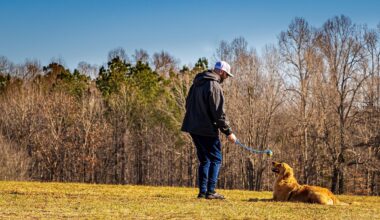Understanding Animal Control Procedures for Dogs: A Legal Overview
Animal control procedures are essential for ensuring compliance with regulations that govern the treatment of dogs. Understanding these regulations can help dog owners navigate the complex legal landscape. It is crucial to recognize that local communities have different laws regarding pet ownership and animal control. Thus, dog owners need to familiarize themselves with local ordinances that outline their responsibilities. These might include licensing requirements, leash laws, and restrictions on certain breeds. Furthermore, animal control officers play a vital role in enforcing these laws. They have the authority to investigate complaints and respond to incidents involving dogs in public spaces. Often, they interact with dog owners to ensure they follow proper protocols to maintain a safe environment for everyone. Additionally, knowledge of the appeals process is important for dog owners. If an owner believes that their dog was wrongfully seized or accused of aggression, understanding their legal rights can help them take appropriate actions. In many cases, knowing the relevant authorities and having access to legal resources can aid dog owners in addressing potential legal issues swiftly. Compliance ensures peace of mind for both owners and community members concerning dog safety.
Local animal control laws dictate how pet owners should manage their dogs, including vaccination status, registration, and leash requirements. Moreover, violations can result in fines or even the forfeiture of the pet. Therefore, dog owners should remain informed about actions that could infringe upon these laws. Inquire about local breed restrictions; some places may ban specific breeds deemed dangerous or aggressive. Additionally, dog behavior plays a crucial role in legal responsibilities. A dog that injures another animal or person could lead the owner to face civil litigation aside from animal control penalties. It’s essential for owners to keep their dogs properly trained and socialized to mitigate behavioral issues that could lead to such incidents. Regular training can make a considerable difference in ensuring that dogs are well-behaved and compliant with regulations. Pet insurance may also be beneficial to mitigate costs that arise from potential claims due to incidents. Understanding these facets of animal control can equip dog owners with crucial information for guarding against legal troubles. Following local regulations not only keeps dogs safe but contributes to a harmonious environment for all community members.
The Role of Animal Control in Communities
Animal control plays a significant role in safeguarding public safety by guiding how dog owners coexist with their pets and the general public. These authorities respond to various issues, such as uncontrolled or dangerous dogs and dog bites. By handling animal-related problems efficiently, animal control helps protect the community while also ensuring that the rights of pet owners are respected. They are responsible for educating owners about local laws regarding pet ownership and responsible behavior in public. Additionally, they may provide resources on proper pet care and management. It is also critical to understand the processes animal control employs when a dog is reported for an issue. This can involve investigating complaints, assessing the situation, and determining the necessary actions. In some cases, owners may be required to attend training sessions or even court hearings if their dog poses a threat. Moreover, the community contributes to the effectiveness of animal control efforts by reporting potential issues. Awareness and engagement with local animal control can foster a safe and responsible pet ownership culture that ultimately leads to a better living environment for everyone.
Incorporating best practices for dog ownership can greatly contribute to minimizing conflicts between dogs and the community. Responsible dog ownership encompasses various aspects, including human-animal interactions, socialization, and training. Dog owners should prioritize socializing their pets with other animals and people from an early age to prevent aggressive behavior later. Furthermore, attending training classes can teach dogs essential commands while helping owners manage their pets effectively. Promoting responsible dog ownership may also involve understanding the importance of proper leashing and muzzling when required. In public spaces, keeping dogs on leashes can prevent them from running into dangerous situations or alarming others. Owners should know where dogs are allowed and abide by leash laws wherever applicable. Alongside practical management, awareness of dog behavior can significantly enhance interactions with pets. This informs owners about their dogs’ body language, which helps in recognizing stress or discomfort. Engaging with community events can help owners connect with other dog enthusiasts, fostering a culture of responsible ownership that benefits the entire neighborhood. Overall, dog owners can significantly impact community relations through dedicated efforts to ensure compliance with local regulations and harmonious coexistence.
Legal Responsibilities and Rights of Dog Owners
Understanding the legal responsibilities and rights of dog owners is vital for safe and enjoyable pet ownership. Familiarizing oneself with pertinent laws regarding ownership can enable owners to better understand their obligations towards their dogs and the public. One key legal responsibility is keeping dogs vaccinated and registered within the local jurisdiction. This often requires proof of rabies vaccination to ensure public health safety. In many jurisdictions, neglecting to abide by such requirements can lead to penalties including fines. Additionally, dog owners should be aware of leash laws, which are laws designed to manage dog behavior in public. Violating these laws can result in fines or animals being seized. On the other hand, dog owners also have rights that protect them under the law. For instance, owners may have the right to appeal against unjust claims made against their dogs. They can contest fines or restrictions imposed by law enforcement if they believe these actions infringe on their ownership rights. Knowing these rights can empower owners, encourage responsible behavior, and facilitate conflict resolution involving pet-related incidents.
Moreover, keeping abreast of any changes in the law or community regulations related to animal control can significantly affect dog ownership statuses. Local councils often review and revise animal control laws to promote public safety and animal welfare. Engaging in community meetings or forums allows owners to express concerns, seek clarification, and advocate for responsible pet ownership policies. This involvement fosters a clear line of communication between local authorities and residents, which can positively influence how laws are applied and enforced. While laws are created to protect everyone, the enforcement of these laws sometimes can be perceived as overly strict. Hence, advocacy for more reasonable or tailored approaches to animal control can bring about beneficial changes without compromising public safety. Also, having access to legal representation when faced with disputes ensures that owners understand their rights and responsibilities. Exploring resources from reputable animal rights organizations can provide further support. Being proactive in addressing animal-related legal issues demonstrates a commitment to responsible dog ownership and community well-being.
Resources for Dog Owners
Dog owners have access to various resources that can aid in understanding legal issues, responsibilities, and best ownership practices. Local shelters often offer educational programs for the community, providing insight into dog behavior, training, and care. Additionally, animal control agencies frequently host informational sessions where members can learn about local laws and regulations surrounding pet ownership. Online platforms also host a wealth of information on responsible dog ownership, ranging from training resources to legal guidelines. Not only does this information help owners better manage their pets, but it also assists in preventing conflicts with neighbors and authorities. Furthermore, engaging with breed-specific organizations can offer unique insights into particular breeds’ behaviors and needs. Owners can gain valuable knowledge through workshops and seminars focused on responsible ownership. Veterinary clinics sometimes organize community outreach programs emphasizing various aspects of dog care, including health, prevention, and socialization. Owners can also seek legal counsel specializing in animal law for deeper understanding and support in navigating legal disputes over dog-related issues. Utilizing these diverse resources promotes responsible ownership and fosters a safer environment for dogs and their human companions.
Ultimately, being a responsible dog owner requires dedication, understanding, and commitment to following local laws and guidelines. A proactive approach helps mitigate potential issues and fosters a positive relationship with the community. Engaging with available resources allows owners to better understand their roles and responsibilities while creating a harmonious living environment. Establishing connections with fellow dog owners through local groups encourages shared learning and support. Collaborating with local authorities can further enhance community engagement as owners work collectively to address and resolve animal-related issues. By participating in training sessions and community events, dog owners can also learn about the latest trends and concerns regarding animal control, thereby maintaining informed practices. Overall, ensuring responsible dog ownership is key to reducing misunderstandings and conflicts with neighbors. Everyone benefits when dog owners understand their responsibilities and actively ensure compliance with laws. Advocating for reasonable regulations and participating in community discussions contribute to a supportive framework surrounding pet ownership. This way, the presence of dogs becomes a valued aspect of the community, contributing to overall well-being and safety for all residents.


